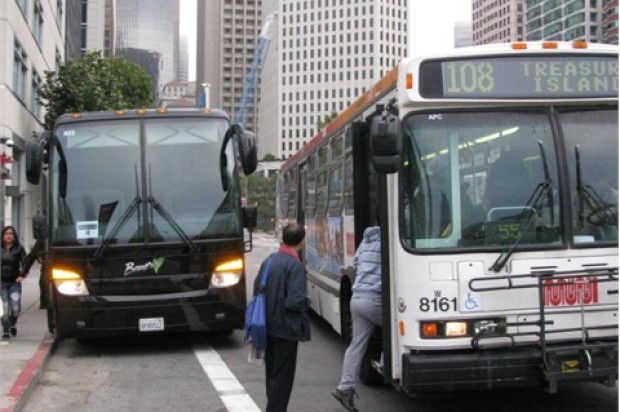
The San Francisco Board of Supervisors decided late Tuesday night to deny an appeal that would have stalled the start of a pilot program for private commuter shuttles.
The 8-2 vote came just after 10:30 p.m., following more than six hours of debate and public comment on the San Francisco Municipal Transportation Agency’s 18-month program that would charge private shuttles $1 per stop to use designated Municipal Railway bus stops.
The program was approved by the SFMTA board of directors in January and is slated to begin July 1.
Opponents of the pilot program filed an appeal after the SFMTA board of directors and the city’s Planning Department green-lighted the program under a California Environmental Quality Act exemption.
The program is expected to cost the agency $1.6 million, which would be recovered through the shuttle fees.
According to the SFMTA, more than 35,000 private shuttle boardings occur each day in San Francisco. As part of the program, the agency will allow the private shuttles to use about 200 selected bus stop locations around the city.
The appeal was filed by a group that included members of Service Employees International Union Local 1021, the San Francisco League of Pissed-Off Voters and housing rights and community activists.
The appellants’ attorney, Richard Drury, told the board that the city is sanctioning illegal use of public bus stops. He said the private shuttles from Google, Genentech, Apple and other companies are “pirate shuttles.”
Drury called for further review of the program and criticized the SFMTA and Planning Department for deciding that the pilot program is about fact-finding and is therefore excluded from a full environmental impact report under CEQA.
During the hearing, Supervisor Scott Wiener pointed to the long history of shuttles in San Francisco to transport workers within and out of the city and contended that the appellants were blocking the program for political instead of environmental reasons.
“There’s the assumption that these technology workers aren’t really San Franciscans,” Wiener said.
Drury contended that a review is necessary to see the impact on residents and infrastructure.
He said the shuttles damage city streets, emit cancer-causing pollution, jeopardize the safety of pedestrians and bicycles, slow down Muni buses and lead to the displacement of many low-income residents who can no longer afford housing in San Francisco.
Drury said longtime city residents are being kicked out to make room for workers who use the shuttles to live in San Francisco and work in Silicon Valley, turning the city into a bedroom community.
Supervisor Jane Kim said that there is no causal connection yet between the buses and housing displacement, while Supervisor David Campos said the SFMTA would be doing more than just data gathering under this pilot.
The hearing continued for hours with input from the appellants, the Planning Department, SFMTA staff, and members of the public both opposing and supporting the program.
The board eventually voted to deny the appeal, with Supervisors John Avalos and David Campos providing the two votes in support.
Supervisor Eric Mar was absent from the meeting.
Chris Daly, political director of SEIU Local 1021, said this morning that the coalition of appellants is looking at possible legal action to overturn the board’s decision on the CEQA appeal.
“Based on the law, we are very confident that the action that the board took last night was illegal,” Daly said.
Daly, a former supervisor who served until 2011, said the program’s opponents were “disappointed by the vote last night” and said the board is “out of touch” with the rest of the city.
Google released a statement shortly after the decision was made.
The statement reads, “We’re excited to continue working with the city of San Francisco on our shared goal of efficient transportation in the Bay Area. Google’s shuttles result in net annual savings of more than 20,000 metric tons of CO2. That’s like taking about 4,000 cars off the road every day.”
Google sponsors 57 shuttles that come into the city every day, providing about 4,400 boardings, according to a report that was released Monday from the city’s budget and legislative analyst.
The Bay Area Council, a local business advocacy group, hailed the board’s decision.
President and CEO Jim Wunderman said in a statement, “The commuter shuttle pilot program will provide valuable information that ensures the shuttles operate in close coordination with the city’s public bus system and minimize any impacts they have on neighborhoods.”
The Bay Area Council released a poll last week that found there was two-thirds support among 500 respondents for the Muni pilot program, and in general more than half of those surveyed felt favorable about commuter buses.
Sasha Lekach, Bay City News









